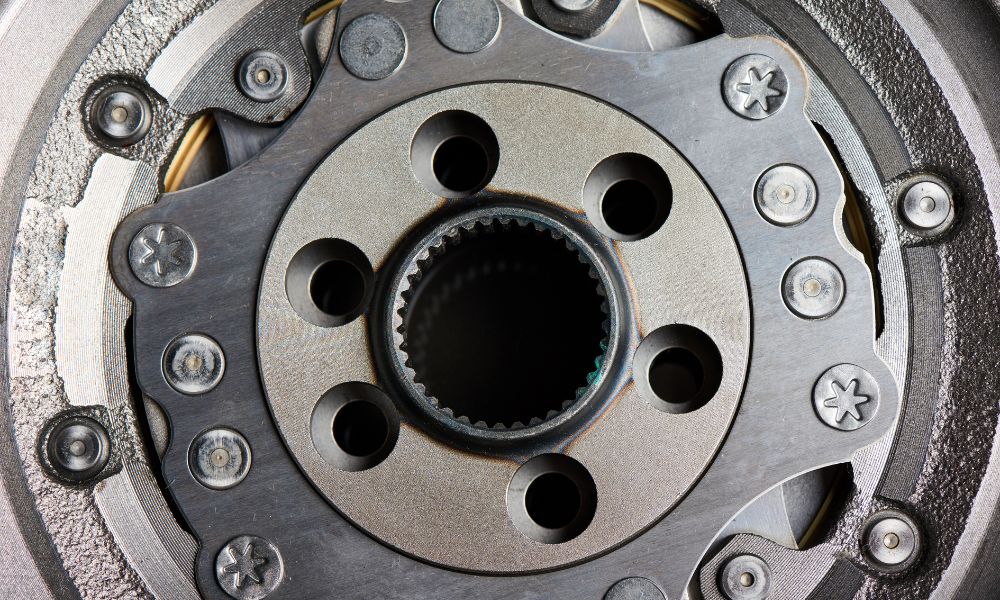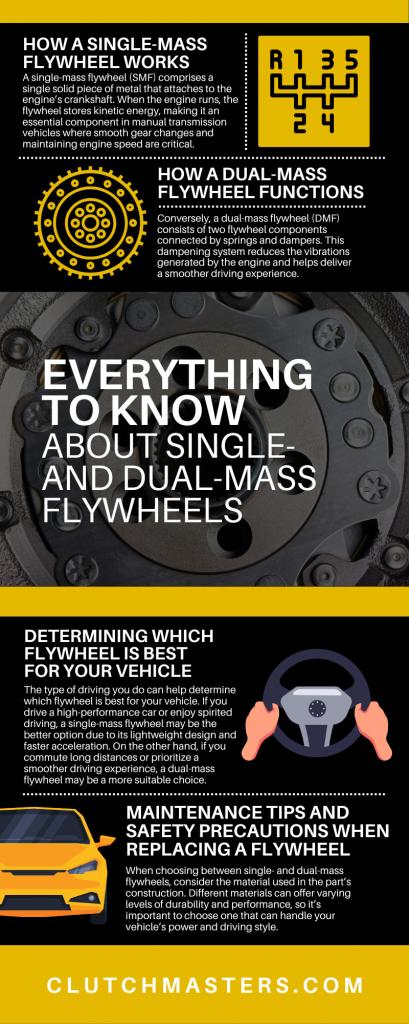Everything To Know About Single- and Dual-Mass Flywheels

The power and performance of your vehicle hinge on multiple components, and the type of flywheel you have can make a significant difference. Take a deep dive into everything to know about single- and dual-mass flywheels, including their inner workings, benefits, and how to determine which one is the best fit for your vehicle.
The Basics of Single- and Dual-Mass Flywheels
Flywheels serve as your car’s kinetic energy storage devices and have two primary variations: single-mass and dual-mass. Single-mass flywheels, also known as solid or lightweight flywheels, are made of a single piece of metal and have been the traditional choice for many years. On the other hand, dual-mass flywheels consist of two components connected by springs or rubber dampers.
How a Single-Mass Flywheel Works
A single-mass flywheel (SMF) comprises a single solid piece of metal that attaches to the engine’s crankshaft. When the engine runs, the flywheel stores kinetic energy, making it an essential component in manual transmission vehicles where smooth gear changes and maintaining engine speed are critical.
Understanding the Benefits of a Single-Mass Flywheel
Now you understand the basics of an SMF and how it works, but what does it offer to drivers? The primary advantages of an SMF are its engine efficiency, acceleration boost, and longer lifespan.
- Engine efficiency: An SMF’s simpler design and direct connection to the engine make for more efficient power transfer, improving overall engine performance. This can result in increased fuel efficiency and reduced emissions.
- Faster acceleration: An SMF’s lightweight design and direct connection to the engine allow for faster acceleration compared to a dual-mass flywheel. This makes it a popular choice for high-performance vehicles or those seeking more responsive driving.
- Extended clutch life: Compared to a dual-mass flywheel, an SMF puts less strain on the clutch due to its simpler design and direct connection to the engine. This can result in a longer lifespan for your vehicle’s clutch system.
How a Dual-Mass Flywheel Functions
Conversely, a dual-mass flywheel (DMF) consists of two flywheel components connected by springs and dampers. This dampening system reduces the vibrations generated by the engine and helps deliver a smoother driving experience.
Analyzing the Advantages of Dual-Mass Flywheels
You know how a DMF functions, but what are its benefits? A DMF has many advantages for your vehicle, primarily its fuel efficiency, easy gear transitions, and low vibration.
- Improved fuel economy: DMFs are known for reducing engine vibrations, resulting in a smoother driving experience. This can improve fuel economy and reduce wear on the vehicle’s drivetrain components. Furthermore, the dual-mass design allows for a more gradual power transfer, which can prevent sudden jerks or jolts while shifting gears.
- Smooth gear transitions: Seamless gear transitions are crucial for maintaining control and preventing damage to your vehicle’s transmission. The DMF’s dampening system helps reduce engine vibrations, resulting in smoother gear changes and minimizing wear on the transmission components. This can also provide a more comfortable driving experience.
- Low vibration: DMFs are designed to reduce engine vibration, making for a smoother and more comfortable driving experience. This can also help prevent damage to other components in the vehicle’s drivetrain.
Determining Which Flywheel Is Best for Your Vehicle
After reviewing the basics of both types of flywheels and their many benefits, how does a driver decide which option is best? The primary considerations when choosing a new flywheel for your vehicle are the driving you’ll be doing, your budget, and the car’s engine power.
Type of Driving You Do
The type of driving you do can help determine which flywheel is best for your vehicle. If you drive a high-performance car or enjoy spirited driving, a single-mass flywheel may be the better option due to its lightweight design and faster acceleration. On the other hand, if you commute long distances or prioritize a smoother driving experience, a dual-mass flywheel may be a more suitable choice.
Your Budget
When deciding on a flywheel, it’s essential to consider your budget. Lightweight flywheels are more affordable due to their simpler design and construction. Meanwhile, dual-mass flywheels can be pricier due to the additional components and dampening system. However, it’s important not to solely base your decision on cost, as the flywheel’s performance and longevity should also be considered.
Engine Power
The amount of power your engine produces can also influence which flywheel best fits your vehicle. A lightweight flywheel may be better suited to handle the increased power and provide faster acceleration if you have a high-horsepower engine. However, if your engine produces less power, a dual-mass flywheel’s dampening system can help prevent vibrations and improve the overall driving experience.
Maintenance Tips and Safety Precautions When Replacing a Flywheel
Replacing a flywheel is not a simple task; it requires careful consideration and attention. Here are some maintenance tips and safety precautions to keep in mind when replacing your vehicle’s flywheel.
Consider the Flywheel Material
When choosing between single- and dual-mass flywheels, consider the material used in the part’s construction. Different materials can offer varying levels of durability and performance, so it’s important to choose one that can handle your vehicle’s power and driving style.
Ensure Proper Installation
Whether replacing a single- or dual-mass flywheel, make sure it is installed correctly. Improper installation can lead to performance issues or even damage to other drivetrain components.
Inspect the Clutch and Other Related Components
When replacing a flywheel, inspecting the clutch and other related components for wear and tear is crucial. It’s recommended to replace these parts simultaneously to ensure optimal system performance.
Use Appropriate Safety Equipment
Replacing a flywheel can be dangerous, so be sure to use proper safety equipment like gloves, eyewear, and necessary tools. It’s also recommended to have a professional mechanic oversee the replacement process if you’re not experienced in car maintenance.
Find Single- or Dual-Mass Flywheels at Clutch Masters Industries
As you can see, this guide covers everything you need to know about single- and dual-mass flywheels—except where to get them! As a leader in automotive technology and performance parts, Clutch Masters Industries is the trusted source for both single-mass flywheels and dual-mass flywheel components. Contact us today to learn more about our quality products and how they can enhance your driving experience. Let us help you find the perfect fit for your vehicle!



